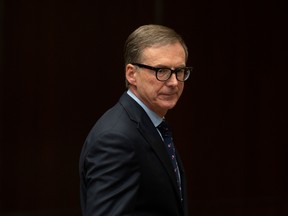Kevin Carmichael: Bank of Canada governor insists an inflation target designed for a different time remains the right approach

Article content
Bank of Canada governor Tiff Macklem is set on getting inflation back to two per cent.
Advertisement 2
Article content
Not 2.8 per cent, or 2.5 per cent. Two per cent.
Article content
“The target is two per cent,” he said from across the table in a meeting room at the central bank’s headquarters in Ottawa.
A portrait of Gordon Thiessen, the Bank of Canada governor who anchored the country’s then-newish inflation target at two per cent in 1995, hangs over the current governor’s right shoulder. (The target was introduced under John Crow a few years earlier, but the initial setting was higher.)
Article content
Three governors have had their portraits done since Thiessen stepped aside in 2001. All were champions of setting interest rates to keep the consumer price index increasing at a year-over-year rate of two per cent, while giving themselves wiggle room of between one per cent and three per cent.
Advertisement 3
Article content
But there are reasons to wonder whether that regime is still fit for purpose, given the world has dramatically changed since the early 1990s. Some on Bay Street are wondering whether Macklem might be comforted if inflation drops to a number that starts with “two,” given the distance he will have to travel to get to “two” itself.
Comfort is on a continuum right now and we’re highly uncomfortable
Tiff Macklem
The consumer price index was hovering around seven per cent in October, better than 8.1 per cent this summer, but still a long way from home. Getting there could require considerable pain.
“Comfort is on a continuum right now and we’re highly uncomfortable,” he said. “Inflation is way too high.”
Macklem’s predecessor, Stephen Poloz, used to remind audiences and interlocutors that two per cent was the midpoint of a range, not a ceiling.
Advertisement 4
Article content
After more than a couple of decades of emphasizing the target, Poloz worried that everyone from policymakers to executives to investors had come to base their decisions on the assumption that inflation would never top two per cent, no matter what. He wondered if psychology was contributing to unusually muted price pressures, creating an “undershooting” of the target that had the effect of capping the economy’s growth potential.
It’s possible. In Canada, inflation tended to average 1.9 per cent. An average of 2.1 per cent or 2.2 per cent might have allowed for a bit more growth or hiring without seriously damaging households’ purchasing power. But the context is different now, and Macklem appears to want to make sure there’s no confusion about what he sees as the endpoint.
Advertisement 5
Article content
“The range is really to give you an idea of what is a normal variation,” he said. A target, “doesn’t mean you’re not going to be outside the range from time to time, but you should be in the range more than half the time. If you want to be in the range more than half the time, you need to aim for the middle of the range.”
We’re not going to sleep easily until price stability is restored and that’s two-per-cent inflation
Tiff Macklem
Inflation has now been outside the range since April 2021, making it the first time it’s been outside the comfort range for any amount of time since the central bank began targeting prices in the early 1990s. Macklem called the current downward trajectory a “bit of a relief,” a sign his decision to raise the benchmark interest rate by four percentage points in less than a year is having the desired effect, but he’s not declaring victory.
Advertisement 6
Article content
“We’re not going to sleep easily until price stability is restored and that’s two-per-cent inflation,” he said.
The Bank of Canada’s latest forecast predicts headline inflation will still be 2.8 per cent at the end of next year, but will finally drop to the target by the fourth quarter of 2024. There will be considerable debate during the months ahead over whether that outlook is realistic, given that significant changes in the structure of the global economy are beyond Macklem’s control.

A long period of muted price pressures started with the adoption of inflation targets three decades ago, implying a correlation. But correlation isn’t the same as causation.
It’s no longer clear that central bankers deserve most of the credit for the Great Moderation. The 1990s and the 2000s brought a confluence of deflationary forces, including China’s rise as the world’s main source of manufactured goods, which had the effect of both lowering retail prices and hurting the bargaining power of workers in North America and Europe. The former curbed wage growth, allowing companies to compete on price without hurting their profit margins.
Advertisement 7
Article content
Baby boomers were still in their prime working years, meaning there was a glut of labour. Some boomers struggled to get raises, but they were still available to help contribute to the economy’s ability to generate non-inflationary growth.
All those forces have reversed and are now inflationary instead of deflationary. China is getting richer, and is no longer a source of cheap labour. Beijing’s geopolitical rivalry with Washington also appears destined to realign supply chains, which could bring stability, but at a higher cost. Boomers, as they retire, will remain consumers, contributing to demand, while doing less to help with supply.
-
![Bank of Canada senior deputy governor Carolyn Rogers.]()
Kevin Carmichael: The failure at the Bank of Canada that likely made inflation worse
-
![None]()
Kevin Carmichael: Why Big Labour should be thanking the Bank of Canada, not bashing it
-
![Bank of Canada governor Tiff Macklem.]()
Kevin Carmichael: Bank of Canada has established its inflation fighting cred. Now it’s up to the numbers
Advertisement 8
Article content
Macklem said the demographic forces that helped central bankers contain inflation for most of his working life are now making the job harder. Yet he insists an inflation target designed for a different time remains the right approach. He believes that things just work better with a little bit of inflation: zero brings too much rigidity, putting the economy at risk of constantly underperforming, while a target of two per cent provides a little grease without causing runaway price increases.
“Yes, the price level is drifting up, but it’s drifting up gradually enough that it doesn’t matter,” he said. “From one year to the next, Canadians are not going to see a big, big change in their cost of living. That’s one less thing for them to worry about, they can get on with the decisions.”
He called low inflation a “public good.” And for now, Macklem is intent on delivering it.
“Yes, there are some big forces that are going to be affecting our economy, other economies, in the years ahead and we’ll have to factor those in and adjust to them,” he said. “But it doesn’t seem to me that giving up on two-per-cent inflation is going to help. If we don’t have price stability, all those things just get more complicated.”
• Email: [email protected] | Twitter: carmichaelkevin
Advertisement
Stay connected with us on social media platform for instant update click here to join our Twitter, & Facebook
We are now on Telegram. Click here to join our channel (@TechiUpdate) and stay updated with the latest Technology headlines.
For all the latest Business News Click Here
For the latest news and updates, follow us on Google News.




